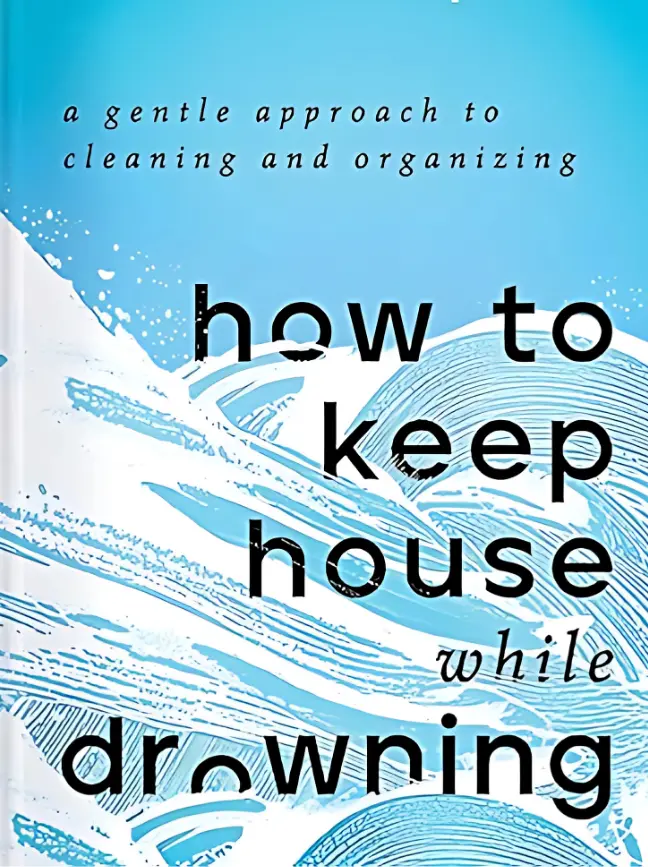chapter 5
gentle self-talk: mess has no inherent
meaning
remember that because care tasks are morally neutral, mess has no inherent meaning. When you look at the pile of dishes in the sink and think, “I’m such a failure,” that message did not originate from the dishes. Dishes don’t think. Dishes don’t judge. Dishes cannot make meaning—only people can.
In fact, the meaning assigned to a care task was probably given to you by someone else. Take a moment to think about who it may have been. Your mother? Father? Partner? A grandparent? What messages were you given about domestic care tasks and the meaning behind them? Where did those ideas trickle down from?
I recently saw someone write on social media, “My grandmother used to say to me, we may be poor but we will be clean. And she would scrub that tiny house until it shone.” I’m learning that when marginalized communities face racism or classism, high standards for cleanliness can be a way for a family to reassert their own dignity in the face of dehumanizing stereotypes about being lazy, unintelligent, or dirty. Loving families might insist that their home sparkle or their children’s clothes be spotless, not out of a perceived superiority, but as a way of protecting against discrimination.
There may be other complex and contextual reasons why your family or community gave you the messages they did about care tasks. You may need time to consider, to honor, to grieve, and to process the origins of such messages. In the end, you may decide those messages do not serve you anymore and give mess a new meaning.
Begin to notice how you speak to yourself on days when you feel you have fallen behind. You can set up the best systems in the world and they won’t change your life if you still hate yourself on days when you can’t keep up. So much of our distress comes not from the unfolded laundry but from the messages we give ourselves. Lazy.
Predictable. Unlovable. You do not need to be good at care tasks to learn how to develop a compassionate inner dialogue. You deserve kindness and love regardless of how good you are at care tasks.
You might also be interested in playing back what you tell yourself when you are “succeeding” in care tasks. Do you feel good when your home is clean and laundry is folded? Ask yourself why. It is one thing to feel the pleasure of having a functional space (it’s easier to find my things; I’m not tripping over toys; my toddler has better focus when the room isn’t cluttered; I have space to work on my hobbies) and quite another to feel the satisfaction of having met a moral standard (I’m good enough; I’m a good mom today; I am meeting expectations; I’m a “real” adult). What you say to yourself when your house is clean fuels what you say to yourself when it’s dirty. If you’re good when it’s clean, you must then be bad when it’s not.
The good news is that you can simply choose to assign your chronic laundry pile a completely different meaning. Instead of thinking, “I can never keep up,” instead say to yourself, “I am so grateful to have so many clothes.” Upon your seeing a dirty kitchen, your inner voice may say something like, “I am such a hot mess,” but challenge yourself to think of something else it could mean. “I cooked my family dinner three nights in a row” is a true statement. If care tasks are morally neutral, then having not showered or brushed your hair in three weeks does not mean “I am disgusting” but instead simply means “I am having a hard time right now.”
Let me tell you what the mess in my home means. It means I’m alive. Dirty dishes mean I’ve fed myself. Scattered hobby supplies mean I am creative. Scattered toys and mess mean I am a fun mom.
The stacked boxes in the hall mean I was thoughtful enough to order what we need. The clothes strewn on the floor mean I had a full day.
And occasionally mess means I’m struggling with depression or stress. But those aren’t moral failings either—and neither is that
moldy coffee cup I keep not taking to the kitchen.
Instead of… Try saying:
Chores → care tasks
Chores are obligations. Care tasks are kindness to self.
Cleaning → resetting the space
Cleaning is endless. Resetting the space has a goal.
It’s so messy in here! → this space has reached the end of its
functional cycle
It’s so messy in here feels like failure. This space has reached
the end of its functional cycle is morally neutral.
Good enough is good enough → good enough is perfect
Good enough is good enough sounds like settling for less.
Good enough is perfect means having boundaries and
reasonable expectations.
Shortcut: skip to chapter 7.
OceanofPDF.com






